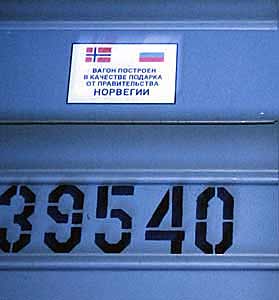The Norwegian Control and Constitutional Committee in the Parliament has evaluated the Norwegian Plan of Action for nuclear safety projects in Russia and made a list of requirements to be implemented in the future projects supported by Norway. Prior to the evaluation Bellona had submitted a list of changes. All Bellona's proposals were included into the final document released by the Committee.
The result of the parliamentary discussion was based on a report from the Norwegian General Accounting Office regarding the Plan of Action for nuclear safety support from Norway to Russia.
Bellona made a list of nine important proposals and suggestions to changes in the Norwegian nuclear safety aid package for projects to come. The parliamentary committee adopted all nine Bellona’s points.
From the early 1990s, Norway has spent some $65m in its program for improving nuclear safety in north-west Russia. For Norway it has been important to go in front internationally to assist Russia in securing its nuclear installations and improve radioactive waste treatment.
The majority in the parliamentary committee underlines the importance of economical and political support to Russia’s nuclear regulatory, Gosatomnadzor (GAN). Improved working conditions for GAN is a key-factor to reach the goal of improved nuclear safety in Russia. So far, many of the Norway supported projects have not been under supervision of GAN. From now on, all Norwegian funded projects must have a written provision, stipulating GANs participation during the planning and implementation stages of each project.
The committee criticises the Ministry of Foreign Affairs way for implementing projects, saying that too many of the projects have not been passed an environmental evaluation before they were given a go-ahead. Future project must have an independent environmental evaluation before they are approved.
Bellona has called for such evaluations during many years. Those calls concerned specifically the Norwegian support to ship submarine spent nuclear fuel from naval bases to the Mayak reprocessing plant in the southern Ural. The reprocessing in Mayak leads to radioactive contamination of Chelyabinsk area and reprocessed waste is much harder to deal with than with spent fuel in dry-storage.
In autumn 1994, Bellona and Chelyabinsk based NGO Movement for Nuclear Safety arranged a hearing in the Norwegian Parliament, where it was said that the worst way of dealing with spent nuclear fuel from naval reactors was to ship it to the Mayak plant. Despite this, the Norwegian Ministry of Foreign Affairs gave several million US dollars to build a train for such spent fuel transport from Kola to Mayak.
Today, the parliamentary committee agrees with Bellona that the entire spent fuel train project was a failure, since it did not improve nuclear safety, instead it just moved the problems from the Murmansk area to Chelyabinsk region.
The committee also says directly that in the future, Norway shall not be involved in any projects dealing with the Mayak-plant.
The parliamentary committee supported the following nine points from Bellona:
All Norwegian financed projects for improving nuclear safety in Russia must have an independent environmental evaluation before they are adopted.
There must be a written provision in all future projects, involving Norwegian support, that GAN should have the right to approve the projects, before, under and after their implementation.
There must be a written provision in all projects, involving Norwegian support, that Norwegian and/or international experts are allowed to inspect the implementation of the projects before, under and after they are developed to make sure that the installations are used in the terms of their initial plan and that they are used in accordance with Russian radiation protection norms.
Norway shall not support any infrastructure projects which later on can be used as a part of the planned importation of spent nuclear fuel to Russia from other countries.
Norway will only allocate financial support to nuclear power plants as long as there exists a written agreement that the money will be spent on closing down the power reactors and their coming decommissioning.
Norway will increase its support to develop alternative energy resources in northwest Russia, including energy efficiency, bio energy, upgrade of hydropower plants and new energy development like hydrogen and windmills.
Norwegian and Russian NGOs (such as Bellona) must have the opportunity to participate as observers in the joint Russian-Norwegian meetings on implementing nuclear safety projects. All relevant documents and information should be open to public as long as they do not contain information that can damage the national security of the countries.
Norway shall not support any projects, which presume continuous reprocessing at the Mayak plant.
Norway should improve the economical and political support to the Russian civilian nuclear watchdog agency Gosatomnadzor so that their internal position in Russia will be stronger.




